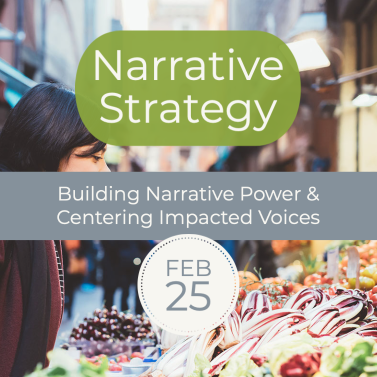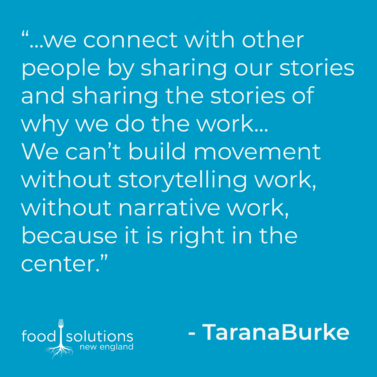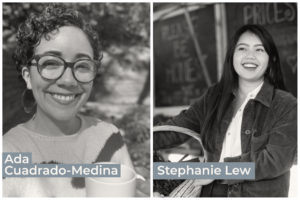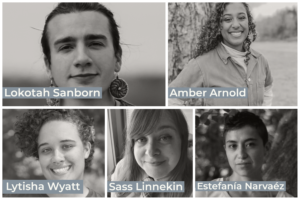Thank you for visiting this events page. Please submit food system events so that we can include them in this listing.

- This event has passed.
FSNE Winter Series #4: Narrative Strategy: Building Narrative Power & Centering Impacted Voices
February 25, 2022 @ 10:00 am - 2:30 pm UTC-5


Narrative Strategy: Building Narrative Power & Centering Impacted Voices
Please join us for the fourth and final event in FSNE’s 2022 Winter Series, bringing regional food system participants and aligned friends together to dig into our shared work, learn together, get inspired, and deepen our connections to one another. Please come for part of all of this event.
In addition to strengthening our regional network, centering racial equity, and embedding our shared values into the regional policy landscape, FSNE knows that employing strategic narrative and framing wisdom is a critical part of the culture change we need in order to transform our food system. Without shifting the way our region thinks about food and related systems, we will continue to struggle to shift actions and behaviors that are desperately needed now.
Building narrative power often has two parts: 1) co-creating and deploying effective strategic framing and messaging by multiple groups, across many platforms over time and, 2) disrupting and de-powering the dominant narratives that actively harm people and places. How do we do that? How do we integrate this aspect of our work into the New England Food Vision?
 As we explore the idea of building narrative power with our guests and our panel of practitioners, we will be considering questions like:
As we explore the idea of building narrative power with our guests and our panel of practitioners, we will be considering questions like:
- What does it look like when the lived experience of impacted communities is central to creating the solutions to our collective challenges? Who is involved in the knowledge-creation that we privilege or rely upon to create plans, programs, and policies?
- Whose stories get “air time?” Who gets to share those stories?
- How do we share stories that lift up harm reduction in parallel with the urgent need to address root causes at this critical time in our culture?
- How can storytelling and communications about our future food system be a powerful form of activism?
- How can we do better at painting compelling and irresistible pictures of a just and resilient food system that works for everyone, while being honest about the challenges and forces that would prevent us from getting there? (i.e. speak the truth, but don’t feed crisis fatigue).
Real Food Real Stories Stephanie Lew and Ada Cuadrano-Medina on the power of storytelling for narrative change. Part 2 (from 12:30 to 2:30 pm) will be a practitioners panel including Sass Linneken of Resources for Organizing for Social Change, Lokaotah Sanborn of Sunlight Media Collective, Amber Arnold of Susu Community Farm, Estefanía Narváez of North American Marine Alliance (NAMA), and Lytisha Wyatt of National Young Farmers Coalition.
This session will be held in English and will be recorded for later viewing. Facilitation by the FSNE backbone staff at the UNH Sustainability Institute and Shane Rogers from the New England Grassroots Environment Fund.

More about our morning “Keychord” guests:
Ada Cuadrado-Media of Real Food Real Stories is dedicated to cultivating moments and spaces for exploration, celebration, and deep connection that nourish us, and open us up to new possibilities—especially around food and community. Her ideal day would start with morning coffee and dancing ritual with her toddler, followed by lively conversations with farmers, chefs, or other food system workers, about their takes on foodshed issues over lunch, then an afternoon with her mom, sketching out ideas for their multimedia family recipe book project centering traditional Puerto Rican dishes they’ve adapted as part of the diaspora. Before joining RFRS, Ada spent 7+ years working in design and marketing roles at small-scale organic and sustainable farms—including a human-grade insect farm—as well as in natural snack brand start-ups based in the Bay Area. Previously she had worked as a food tour guide in Washington DC, an in-house graphic designer, and a conference manager for a finance-focused organization.
In her role as Digital Media Manager at Real Food Real Stories, Ada designs and manages digital spaces that encourage connection, exploration, and reflection through storytelling and participation within and beyond our place-based food communities. Ada believes that everyone’s creative, inquisitive sense of play needs to be fed and unleashed regularly so we can see, and build the irresistible food future we all want, together. In addition to cultivating RFRS’ social media and nourishing digital landscapes for community, she is currently working with the team on the RFRS Story Library—a searchable multimedia archive of past RFRS stories.
Stephanie Lew of Real Food Real Stories: Stephanie’s journey with food has been about building and renewing relationships with her community, place, and self. Her colorful engagement with food includes farming on a 400-acre, diversified, organic farm, carbon farming on rangeland, connecting people to soil, changing the narrative around ‘ugly produce’, and selling produce at farmers markets. Stephanie has found communing over food to be the most human way to understand and be in relationship with the world around her. Stephanie first joined RFRS as a participant in our story facilitation training, and later as a member of the 2021 RFRS Facilitator Cohort. The experience had a profound impact on her ability to find her voice and name her truths around being a Chinese-American, and inspired her to join the RFRS team. She continues to do the work of exploring and reclaiming her heritage through story, narrative, and cultural strategies, and is excited to share the same opportunities with the broader community.
As Program Coordinator, Stephanie’s full-hearted engagement and passion for this work presents itself in the form of unabashed, thoughtful, inquisitive, and strategic questions and a unique form of leadership that invites the team to get clear about the choices they make and the language they use, ensuring that the programs are thoughtful, authentic, and meaningful.
More about our panelists:
Amber Arnold: “My ancestors come from many places including Haiti, New Orleans, Foggia, Mississippi, Virginia, Florida, and many more. I am a Multiracial Black/brown Kreyol Italian born in Woburn, MA transcending spaces from Nashville, TN thru the North East. I AM a commitment to collective liberation, to nourishment, to co-creating land based places and spaces for Black and Brown folx to thrive and experience liberation in real time and for the generations to come after.”
Lokotah Sanborn: “The Sunlight Media Collective is an organization of indigenous and non-indigenous media makers and activists, including Wabanaki tribal members, working to document and present stories affecting Wabanaki people and highlighting Wabanaki perspectives, with a particular emphasis on the intersection between environmental issues and tribal rights. We have found that current media representations often offer problematic narratives, rife with mistruths, prejudice, fear mongering and misunderstanding. This lack of understanding is a detriment to the Wabanaki Tribes’ environmental health, cultural survival and sovereignty, and to Tribal-State relations. The goal of our work is to facilitate understanding, analysis and historical context, and to create and organize educational opportunities and events for alliance building and social change.”
Estefanía Narváez is a Digital Organizer with NAMA, (North American Marine Alliance) who focuses on the power and techniques of organizing to make change. NAMA is a fishermen-led organization building a broad movement toward healthy fisheries and fishing communities. NAMA builds deep and trusting relationships with community based fishermen, crew, fishworkers and allies to create effective policy and market strategies.
Sass Linneken (they/them) is a late-blooming, nonbinary, queer grandparent who is having a love affair with working as the Executive Director of Resources for Organizing and Social Change. On their own in the world since age 16, and a veteran of chronic homelessness who lives with a number of disabilities, Sass is no stranger to what it means to struggle and how it feels to try and thrive in a world where the deck is stacked against those with the least. As a result, though Sass much enjoys engaging in various types of direct-relief volunteer work, what they most enjoy is organizing to create a world that values mutual aid, human connection, joy, and a searing disdain for white supremacy, classism, and any other form of oppression that devalues the beauty in what it means to simply be existing. In addition to the work ROSC’s staff does, ROSC also functions because of the invaluable work of other consultants, a highly dedicated Board of Directors, and a large handful of indispensable volunteers.
Lytisha Wyatt comes to National Young Farmers Coaltion with several years of social media management, vegetable and livestock farming, poultry processing, and food service industry experience. Lytisha graduated from Brown University with a B.A. in Health and Human Biology, where she focused on how the mainstream media and social biases impact dominant understandings of health and diet.
Thank you for visiting this events page. Please submit food system events so that we can include them in this listing.





